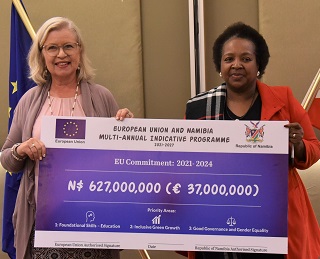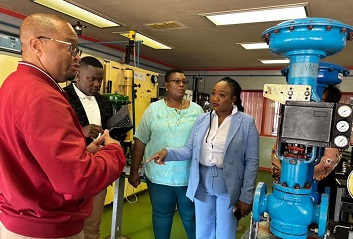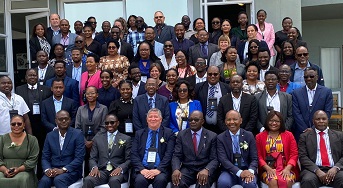
Namibia- EU launch 7-year Multi-Annual Indicative Programme

By Clifton Movirongo.
The European Union (EU) and the government jointly launched the initiative titled Multi-Annual Indicative Programme (MIP), covering the period 2021-2027, whereby people will be supported in human development and education, giving children and youth a chance for a better future, officials said.
In a joint statement, the EU and the National Planning Commission have indicated that for the inception period of the cooperation programme, covering 2021 – 2024, the EU will provide financial support of more than N$627,000,000 for the outlined priorities.
Furthermore, according to both parties, the indicative financial allocation for the period 2025-2027, will be announced following the mid-term review of the implementation of the MIP, which will include a dialogue with the authorities and other stakeholders of Namibia, officials added.
The objective of the programme targets priority areas such as foundational skills through which support will be given to the Early Childhood Development (ECD) programme to improve the quality and accessibility of ECD, among other things, to improve equitable and inclusive access and the quality in Pre-Primary Education.
According to the National Planning Commission Executive Director, Wilhencia Uiras, the MIP is aligned to Namibia’s 5th National Development Plan, the Harambee Prosperity Plan, and Vision 2030.
Uiras commended the financial support by the EU, adding that alternatively, it will strengthen the collective and shared vision of an educated, capable and prosperous Namibian nation.
At the launch, European Union Ambassador to Namibia, Sinikka Antila, further explained that the programme also supports good governance and strengthens inclusive green growth, creating new opportunities for Namibian individuals and businesses.
For the inclusive green growth priority area, the focus will be on renewable energy, water, and sanitation, climate change adaptation, and mitigation as well as biodiversity conservation.
“The EU is currently also strengthening its partnership on Critical Raw Materials and Green Hydrogen with Namibia,” reads the statement.
Meanwhile, regarding the good governance and gender equality priority area, this will provide institutional capacity building for enhanced governance performance, an improved enabling environment for Civil Society, and better service delivery, officials added.
“Support will be provided to e.g. enhance the Anti-Corruption Commission’s capacity and to accelerate the implementation of the National Anti-Corruption Strategy, to strengthen Parliament, and to address Gender-Based Violence,” the statement continued.
“The MIP and identification of priority areas were undertaken in consultation with the Namibian government, Civil Society Organizations, private sector, EU Member States and UN Organisations.”












































